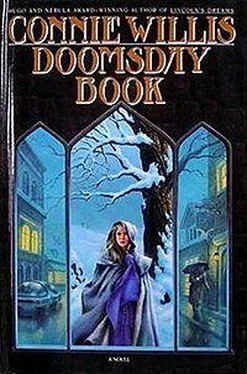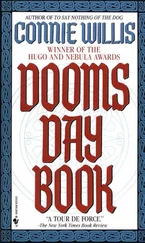Far ahead, a flame flickered, illuminating nothing but itself. It went out. Dunworthy started toward it.
"Hold on a minute," Colin said, and flashed on a pocket torch. It blinded Dunworthy, making everything outside its diffused beam as black as when they first came in. Colin shone it around the church, on the painted walls, the heavy pillars, the uneven floor. The light caught on the shape Dunworthy had thought was a body. It was a stone tomb.
"She's up there," Dunworthy said, pointing toward the altar, and Colin obligingly aimed the torch in that direction.
Kivrin was kneeling by someone who lay on the floor in front of the rood screen. It was a man, Dunworthy saw as they came closer. His legs and lower body were covered with a purple blanket, and his large hands were crossed on his chest. Kivrin was trying to light a candle with a coal, but the candle had burned down into a misshapen stub of wax and would not stay lit. She seemed grateful when Colin came up with his torch. He shone it full on them.
"You must help me with Roche," she said, squinting into the light. She leaned toward the man and reached for his hand.
She thinks he's still alive, Dunworthy thought, but she said, in that flat, matter-of-fact voice, "He died this morning."
Colin shone the pocket torch on the body. The crossed hands were nearly as purple as the blanket in the harsh light of the torch, but the man's face was pale and utterly at peace.
"What was he, a knight?" Colin said wonderingly.
"No," Kivrin said. "A saint."
She laid her hand on his stiff one. Her hand was calloused and bloody, the fingernails black with dirt. "You must help me," she said.
"Help you what?" Colin asked.
She wants us to help her bury him, Dunworthy thought, and we can't. The man she had called Roche was huge. He must have towered over Kivrin when he was alive. Even if they could dig a grave, the three of them together could not carry him, and Kivrin would never let them put a rope around his neck and drag him out to the churchyard.
"Help you what?" Colin said. "We don't have much time."
They hadn't any time. It was already late afternoon, and they would never find their way through the forest after dark, and there was no telling how long Badri could keep the intermittent going. He had said twenty-four hours, but he had not looked strong enough to last two, and it had already been nearly eight. And the ground was frozen, and Kivrin's ribs were broken, and the effects of the aspirin were wearing off. He was beginning to shiver again here in the cold church.
We can't bury him, he thought, looking at her kneeling there, and how can I tell her that when I have arrived too late for anything else?
"Kivrin," he said.
She patted the stiff hand gently. "We won't be able to bury him," she said, in that calm, expressionless voice. "We had to put Rosemund in his grave, after the steward — " She looked up at Dunworthy. "I tried to dig another one this morning, but the ground's too hard. I broke the spade." She looked up at Dunworthy. "I said the mass for the dead for him. And I tried to ring the bell."
"We heard you," Colin said. "That's how we found you."
"It should have been nine strokes," she said, "but I had to stop." She put her hand to her side, as if remembering pain. "You must help me ring the rest."
"Why?" Colin said. "I don't think there's anybody left alive to hear it."
"It doesn't matter," Kivrin said, looking at Dunworthy.
"We haven't time," Colin said. "It'll be dark soon, and the drop is — "
"I'll ring it," Dunworthy said. He stood up. "You stay there," he said, though she had made no move to get up. "I'll ring the bell." He started back down the nave.
"It's getting dark ," Colin said, trotting to catch up with him, the light from his torch dancing crazily over the pillars and the floor as he ran, "and you said you didn't know how long they could hold the net open. Wait a minute."
Dunworthy pushed open the door, squinting against the expected glare of the snow, but it had grown darker while they were in the church, the sky heavy and smelling of snow. He walked rapidly across the churchyard to the belltower. The cow which Colin had seen when they rode into the village ducked through the lychgate and ambled across the graves toward them, its hooves sinking in the snow.
"What's the use of ringing it when there's no one to hear it?" Colin said, stopping to switch off his torch and then running to catch up again.
Dunworthy went in the tower. It was as dark and cold as the church and smelled of rats. The cow poked its head in, and Colin squeezed past it and stood against the curving wall.
"You're the one who keeps saying we have to get back to the drop, that it's going to close and leave us here," Colin said. "You're the one who said we didn't have time even to find Kivrin."
Dunworthy stood there a moment, letting his eyes adjust and trying to catch his breath. He had walked too fast, and the tightness in his chest was back. He looked up at the rope. It hung above their heads in the darkness, a greasy-looking knot a foot from the frayed end.
"Can I ring it?" Colin said, staring up at it.
"You're too small," Dunworthy said.
"I'm not ," he said and jumped up at the rope. He caught the end, below the knot and hung on for several moments before dropping, but the rope scarcely moved, and the bell only clanged faintly and out of tune, as if someone had hit the side of it with a rock. "It's heavy ," he said.
Dunworthy raised his arms and took hold of the rough rope. It was cold and bristly. He yanked sharply down, not sure he could do any better than Colin, and the rope cut into his hands. Bong .
"It's loud!" Colin said, clapping his hands over his ears and gazing delightedly up at it.
"One," Dunworthy said. One and up. Remembering the Americans, he bent his knees and pulled straight down on the rope. Two. And up. And three.
He wondered how Kivrin had been able to ring any strokes at all with her hurt ribs. The bell was far heavier, far louder than he had imagined, and it seemed to reverberate in his head, his tightening chest. Bong .
He thought of Ms. Piantini, bending her chubby knees and counting to herself. Five. He had not appreciated what difficult work it was. Each pull seemed to yank the breath out of his lungs. Six.
He wanted to stop and rest, but he didn't want Kivrin, listening inside the church, to think he had quit, that he had only intended to finish the strokes she had begun. He tightened his grip above the knot and leaned against the stone wall for a moment, trying to ease the tightness in his chest.
"Are you all right, Mr. Dunworthy?" Colin said.
"Yes," he said, and pulled down so hard it seemed to tear his lungs open. Seven.
He should not have leaned against the wall. The stones were cold as ice. They had set him shivering again. He thought of Ms. Taylor, trying to finish the Chicago Surprise Minor, counting how many strokes were left, trying not to give in to the pounding in her head.
"I can finish it," Colin said, and Dunworthy could scarcely hear him. "I can go get Kivrin, and we can do the last two strokes. We can both pull on it."
Dunworthy shook his head. "Every man must stick to his bell," he said breathlessly and yanked down on the rope. Eight. He must not let go of the rope. Ms. Taylor had fainted and let it go, and the bell had swung right over, the rope whipping like a live thing. It had wrapped itself around Finch's neck and nearly strangled him. He must hold to it, in spite of everything.
He pulled down on the rope and hung onto it till he was certain he could stand and then let it rise. "Nine," he said.
Colin was frowning at him. "Are you having a relapse?" he said suspiciously.
Читать дальше












